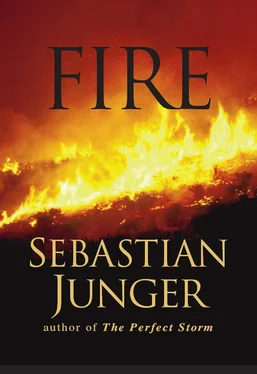The season blew up a few weeks later. I was back on the East Coast when I got a call from Frank Carroll, the information officer for the Boise National Forest, who said that lightning strikes were now starting fires by the dozen at the upper elevations. A twenty-year-old fire fighter had been killed by a snag at the tiny Cascade fire; it hit her so hard that her hard hat was driven into her head. A smoke jumper broke his pelvis while landing on the Red Mountain fire. The town of Cuprum had to be cleared of all thirty residents when the Windy Ridge fire detonated into a five-thousand-acre blaze in one afternoon. A Diamond Mountain hotshot on the Horsefly fire was knocked five hundred feet down a hillside by a flaming log because he had shoved a friend out of the way before trying to dodge it himself. A total of eleven thousand people were on the fire lines at one time, Carroll said, and water levels were so low that Boise-area farmers had been shut off two months early.
A big runaway fire was almost inevitable, and it finally hit at the end of August. On the afternoon of Wednesday, August 19, a thunderstorm swept past Boise and lightning ignited the rangeland east of town. The fire quickly overwhelmed the BLM engine crews sent to deal with it and made its way up into the Boise foothills, leaping the quarter-mile-wide canyon of the South Fork of the Boise River with ease. By then it was in steep terrain and flashing through the grass and sagebrush almost faster than a person could run. Temperatures were in the nineties, and the relative humidity had bottomed out at 5 percent. Conditions were so fast that the fire encircled the town of Prairie and almost torched it, forcing the evacuation of all one hundred residents. The only store in town—complete with a hitching post and a bar—was selling T-shirts that said: “We interrupt this marriage to bring you the fire season.”
It was called the Foothills fire, and I got on it ten days after it first ignited. Snags in the timber were dropping at an estimated rate of forty an hour, prompting overhead to pull crews off the lines at night. This in turn prompted locals to say that the fire fighters weren’t working hard enough. I was assigned to the Union Hotshots out of La Grande, Oregon. Not only was Union one-third women, but its crew boss, Kelly Esterbrook, was one of only ten women ever to have made it through the brutal smoke jumper training course. The Union Hotshots were one of three crews guarding a strategic section of the fire line and if temperatures stayed high and the wind picked up, they would be right in the middle of things. The fire could roll right across the handlines and into a big stand of diseased ponderosa in the high country, and if it did that, it would be virtually unstoppable.
A public information officer named Karen Miranda had been assigned to take me up the fire line to meet the Union Hotshots. I picked up my Nomex clothes and fire shelter at the Forest Service headquarters in Boise, bought notebooks and blank cassette tapes, and raced east toward the town of Prairie. It was thirty miles away across a huge swath of dead black rangeland. I had to make the fire camp before three o’clock, when the helicopters started making their evening runs out to the crews, and I got in with a half hour to spare. When I walked up to Ed Nesselroad, the senior fire information officer, he was telling someone about a live elk that had been found with its eyes burned out. He quickly rounded up Karen Miranda, and by late afternoon we were strapped into the canvas seats of an Evergreen helicopter and waiting to be shipped to helispot six—H-6, as it is called—northeast of Prairie.
We got the same warnings as before, except that this time we were shown the emergency shutoffs in case we crashed and the pilot was unconscious. (Never get out of a downed helicopter with the rotors still turning.) We lifted off and immediately could see a cauldron of smoke boiling up out of a valley. Dozens of helicopters flew in and out dumping retardant, and away to the south stretched an endless carpet of blackened rangeland. Trees torched below us, and the sweet, sharp smell of smoke filled the cabin. The helicopter made several low passes at H-6 and finally settled down after the helispot crew had cleared some cargo out of the way.
H-6 was on a ridge just below a vegetation line where ponderosa gave way to alpine fir. Just over a hill was tiny Smith Creek Lake, cupped in the topography like a jewel in some huge brown palm. Tents and bedrolls were scattered through the ponderosa. Hotshots lounged with books or talked in small groups or just sat and stared. A slingload of gear waited to be sorted below the helispot, and near it was a huge pile of cardboard boxes and plastic buckets. It was our food for two days.
An inflamed red sun was setting over the ridge, and smoke was pumping out of a valley to the west of us. Occasionally a tree torched on the ridge and then died down, lighting the campsite—it was dark by the time we ate—with a dull glow. Hotshots stopped eating and turned to watch. These were people who couldn’t even remember how many fires they’d been on, I thought. Still, they couldn’t keep from looking at open flame. There are stories of crews getting overrun by fire because they were too mesmerized by it to run away.
The camp we were at was termed a spike camp, and the hotshots here—sixty of them plus several helitack crew members—were said to be spiked out. That meant that they were established in a roadless area and supplied by helicopter with food, tools, and paper sleeping bags (marginally warm but washable and reusable). According to Forest Service policy, hotshots should not be spiked out for more than two days in a row. One level less comfortable than a spike camp is the coyote camp, and hotshots are not universal in their love of coyote camps. Coyoteing, as it is called, means dropping in exhaustion wherever you happen to be when it gets dark. Because hotshots have only their line packs when they fight fire, they are usually caught without food, sleeping bags, extra clothes. If it’s cold, they will make a fire in the black—the burned area—and huddle around it all night. If it’s really cold, they might decide to keep building line simply to keep warm. For food, they might have thought to pack some military MREs (meals ready to eat). If not, they go hungry.
The trees torched intermittently all night, I would wake up and see their glow. The sound of flames consuming pine trees one by one easily carried the mile to camp. I tried, and failed, to imagine what it would be like to be burned over. In 1910 a fire storm overtook a group of forty-five fire fighters who were trying to escape an Idaho fire called the Big Blowup. The leader, Edward Pulaski—who later manufactured the tool that bears his name—led them into an abandoned mine shaft and had to keep them there at gunpoint because they were so terrified. Five men died; the rest emerged several hours later, burned and dazed. They had survived a fire storm of such ferocity that entire hillsides of timber had been flattened by fire and convection wind.
The hotshots were up well before dawn, as usual, rustling about quietly with their head lamps on. It was very, very cold at that altitude at that hour, and I put on everything I had and wandered down the hill to the kitchen area. There would be a briefing at six while people ate, and then they would attack the fire. The smell of smoke still permeated the camp, but the fire had quieted down during night, and trees no longer torched along the ridge. Fires generally “lay down” after dark because the temperature drops, meaning that the relative humidity rises. People poured themselves cereal and coffee and sat on the hillside, eating and listening to the morning briefing.
The division supervisor, a gruff, stocky man named Fred Bird, stood on a crate in the half-light and projected the plans for the day out across the mountainside. “Okay, we’re gonna try to hold our own on that ridge,” he said. “We’ve got good air support, and they’re going to work us here all day today and then bump us back to camp. Tomorrow they’ll get in some type two crews to hold the ridge and send ’shot crews up to the North Zone to chase spots down that canyon.”
Читать дальше












